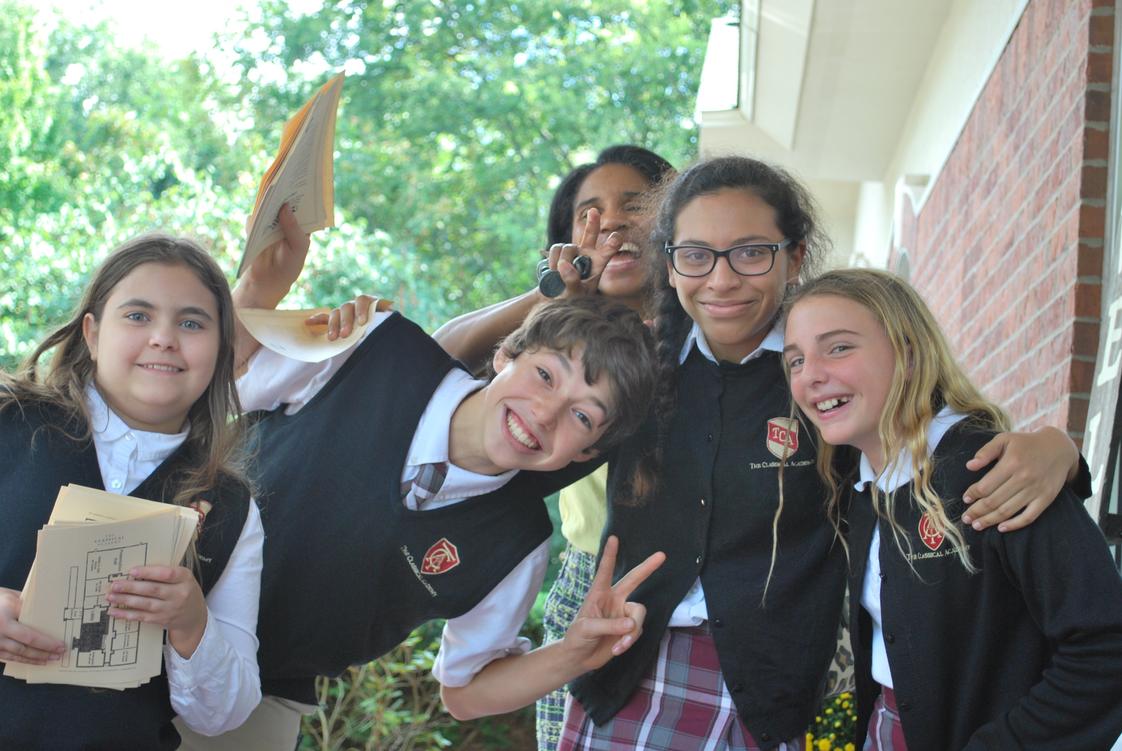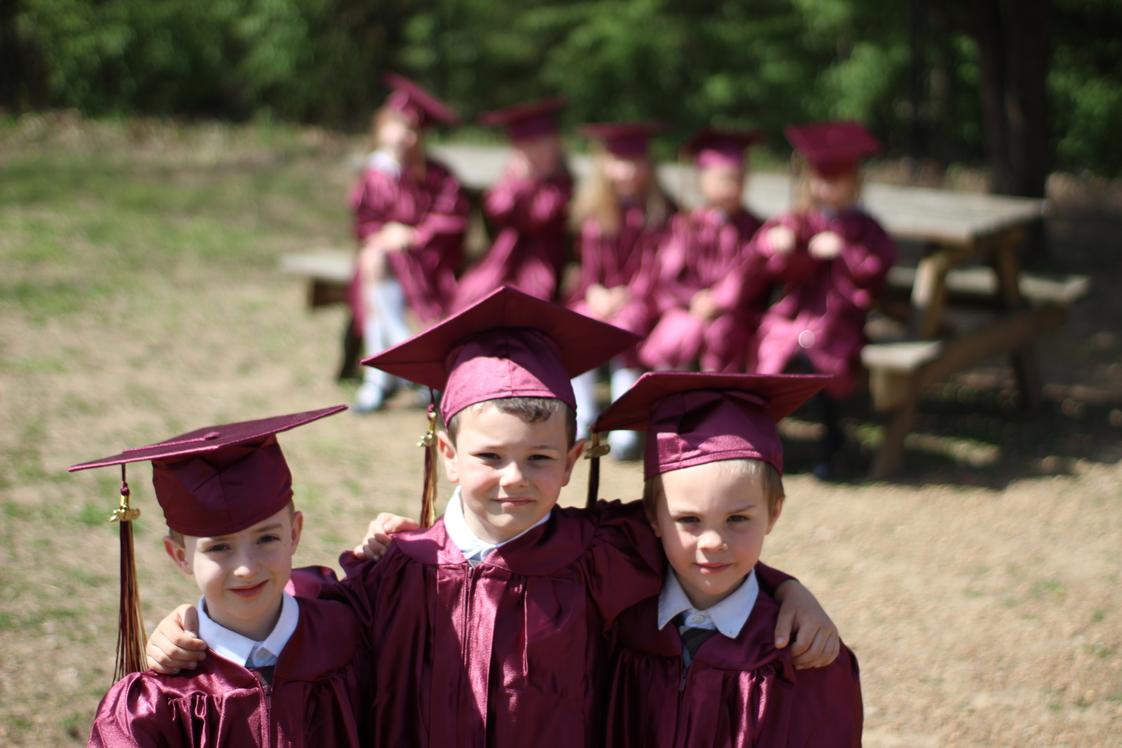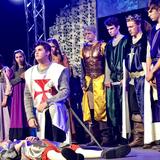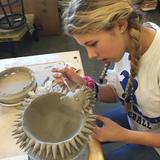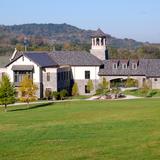Trinitas Classical Academy delivers a Christ-centered, classical education (Pre-K12), blending academic excellence with faith in a close-knit community.
Our Lower School (Pre-K6th) builds foundational skills in math, language, Latin, and critical thinking through engaging methods like chanting, games, and small-group instruction, nurturing a love for God's truth.
The Upper School (7th12th) emphasizes logic and rhetoric, featuring the Omnibus curriculum (humanities) with works like Augustine's Confessions and Shakespeare, AP courses, electives, and athletics like cross country and trap shooting, ensuring a college-ready, faith-integrated experience. We integrate logic, public speaking, and STEM with classical learning to equip students for purposeful lives.
To support this mission, we're enhancing learning and pursuing the highest standards of classical Christian education, offering a personalized, time-proven approach.
Families covenant together, encouraging one another and sharing Trinitas' story to strengthen our vibrant community. Trinitas blends faith, academics, and personal connection to prepare students for college and a life rooted in God's truth.
Quick Facts (2026)
- Top-Ranked TN School
- Grades: Prekindergarten-12
- Enrollment: 96 students
- Yearly Tuition: $11,950
- Average class size: 10 students
- Application Deadline: None / Rolling
- Source: Verified school update
Top Rankings
Trinitas Classical Academy ranks among the top 20% of private schools in Tennessee for:
Category
Attribute
ACT Score
School Overview
School Membership(s)School Assoc.
Religious Affiliation
Grades Offered
Grades Prekindergarten-12
Year Founded
1993
School Calendar
Last Day of School
Wed. May 20, 2026
Student Body
Total Students
96 students
Student Body Type
Co-ed
% Students of Color
13%
State avg.: 20%
Students by Grade
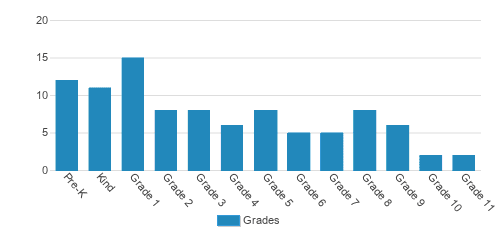
Academics and Faculty
Total Classroom Teachers
15 teachers
Student-Teacher Ratio
6:1
National avg.: 11:1
Average Class Size
10 students
List of Courses Offered
AP/Advanced Courses
AP Calculus ABAP Computer Science A
AP Statistics
Average ACT score
29
(Out of 36)
Matriculation DataMatric. Data
Classroom Dress Code
Formal
Uniform
Tuition and Acceptance Rate
Admission Deadline
None / Rolling
Yearly Tuition Cost
$11,950
Tuition Notes
Sibling discounts are available in K-12; both academic scholarships and needs-based financial aid are available; pastor and alumni discounts
% on Financial Aid
16%
Average Financial Aid Grant
$4,500
Application URL
Endowment Size
$0.25 million
Sports
Total Sports Offered
2 sports
Extracurriculars
Total ExtracurricularsTotal Extra-curric.
5 extracurriculars
ExtracurricularsExtra-curric.
Club or Organization:
Arts and Music Programs:
Recreational Athletic Programs:
Community Service ClubsProgramming Club
Robotics Club
Arts and Music Programs:
Theater Club
Recreational Athletic Programs:
Gymnastics
School Notes
- School Mascot: Eagles
- Lower School (Pre-K6th Grade: Grammar Stage)At Trinitas Classical Academy, our Lower School (Pre-K6th grade) lays a strong foundation for lifelong learning through a Christ-centered, classical education. In the grammar stage, students build essential knowledge and skills, guided by the principle that "the known leads to the unknown" (John Milton Gregory). Pre-K2nd grade (pre-grammar) introduces language and math fundamentals-numbers, counting, basic operations, phonics, spelling, and reading-through engaging methods like singing, chanting, and games. Students begin formal English grammar, learning parts of speech and sentence construction, and start Latin in the 3rd grade. In 3rd6th grade (upper grammar), students deepen these skills, tackling more complex math, longer writing assignments, and thought-provoking discussions to prepare for the logic stage. Our small classes and dedicated teachers foster a supportive, faith-integrated environment, encouraging independent learning and critical thinking while nurturing a love for God's truth.
- Upper School (7th12th Grade: Logic and Rhetoric Stages)The Upper School (7th12th grade) equips students for wisdom and eloquence through the logic (7th9th) and rhetoric (10th12th) stages. In the logic stage, students develop critical thinking, making connections across subjects through debates, skits, and written arguments. They challenge ideas respectfully, growing in their God-given identity while building on the grammar stage's foundation. The rhetoric stage focuses on applying knowledge with wisdom, training students to articulate arguments and analyze assumptions in light of Scripture. The Omnibus (humanities) curriculum, a cornerstone of our program, engages students with great works like Augustine's Confessions, Beowulf, Shakespeare, and The Divine Comedy, fostering deep discussions, oral presentations, and writing. New offerings include 10 honors credits, AP courses, electives, and athletics like cross country, ensuring a college-ready, faith-integrated experience. Our classical integration of disciplines, including logic, rhetoric, STEM, and public speaking, prepares students for higher education and life, distinguishes Trinitas from other schools.
Source: Verified school update
Frequently Asked Questions
How much does Trinitas Classical Academy cost?
Trinitas Classical Academy's tuition is approximately $11,950 for private students.
What schools are Trinitas Classical Academy often compared to?
Trinitas Classical Academy is often viewed alongside schools like Franklin Classical School by visitors of our site.
What sports does Trinitas Classical Academy offer?
Trinitas Classical Academy offers 2 interscholastic sports: Cross Country and Marksmanship.
What is Trinitas Classical Academy's ranking?
Trinitas Classical Academy ranks among the top 20% of private schools in Tennessee for: Highest average ACT score.
When is the application deadline for Trinitas Classical Academy?
The application deadline for Trinitas Classical Academy is rolling (applications are reviewed as they are received year-round).
School Reviews
5 12/20/2025
We are incredibly grateful for Trinitas Classical Academy that our child has attended for several years. The teachers combine academic rigor with biblical truth, cultivating wisdom, character, and a love of learning. The curriculum is thoughtful, the community is warm, and communication is excellent. Our child is challenged, encouraged, and known personally. We see growth spiritually, intellectually, and socially every day. We highly recommend this school to families seeking excellence and faithful leadership that truly partners with parents joyfully.
5 11/28/2025
As an alumni I highly recommend this school. I attended for fourteen years and enjoyed every one. The Upper School Omnibus program was especially formative for me, as I was taught to see the history of the world, of philosophy, literature, and theology through the perspective of Christ and his work. While working in this environment I also made close friends, many of whom I still see on a regular basis. TCA is doing good work that is difficult to find elsewhere, and I hope they continue to grow and thrive.
5 11/14/2025
Our child has been at the school for 11 years, and we have had a very positive experience. The school has a family atmosphere—not institutional like some large schools—and the intentional emphasis on Christ in everything that the school does is so refreshing. Plus, their academics are top-notch. The children read worthy literature and are taught essential critical thinking skills. I recommend this school to everyone I talk to!
5 9/19/2025
Trinitas is a sweet school with teachers who are committed to providing a faith-based education to its students.
5 8/30/2025
I am a retired teacher from Trinitas Classical Academy (TCA). Having taught TCA's kindergarten for seventeen (17) years, I wholeheartedly recommend and support TCA, its teaching staff, administrators, board members, its curriculums, and its Christian, classical pedagogy. The teacher/student ratios are perfect, the students are respectful, and the parents and grandparents are like extended family.
5 8/30/2025
We couldn't be happier with the education our son is receiving at Trinitas. Not only is it strong academically, the Classical Christian approach ensures that everything is grounded in a Biblical world view with the goal of gaining wisdom - teaching kids how to think and reason well. It is an amazing community of families and we feel so blessed that we found it.
5 8/30/2025
We love this school. The tiny class sizes and family atmosphere are exactly what we were looking for in a Christ-centered education. The classical model develops thinkers, not just followers. And the small class size allows teachers to give the attention needed to each student. It's evident that every teacher there really cares about each student. Most importantly, Christ is the center point from which everything else derives meaning.
5 8/22/2025
We've been at TCA since PreK and have loved every milestone, year, and growth it has brought. As we're now in upper school we can see just how the Lord has worked in our son to gain maturity (but still love joy and life) and growth and to think for himself with discernment. Frankly, I'm a bit jealous I didn't have this education growing up. We love our community at TCA who are now family to us.
5 8/8/2025
Trinitas is a wonderful classical school, an intimate community of like-minded families and staff. We have been here for 4 years and feel that our children are receiving a well-rounded education and have an edge on Biblical knowledge and are enriched by the songs, literature, and what is instilled in their hearts daily.
Endorse Trinitas Classical Academy. Endorsements should be a few sentences in length. Please include any comments on:
- Quality of academic programs, teachers, and facilities
- Availability of music, art, sports and other extracurricular activities
- Academic or athletic awards
Recent Articles

Private School Fees Increase Mid-Year: A Parent Action Plan
A 2026 parent action plan for managing mid-year private school tuition increases, including contracts, negotiation tips, and financial options.

Private School Scholarship Scams & Red Flags to Watch Out For (2026 Guide)
Learn how to spot private school scholarship scams in 2026, including red flags, real examples, and expert tips to protect families.

Diversity in Private Schools: Progress and Obstacles in 2026
Explore how private schools are advancing diversity in 2026, key gains made, ongoing challenges, and what families should know.

